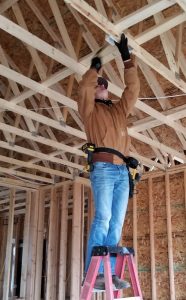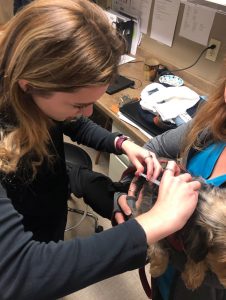Work-Based Learning Internships Give Students Direction
(Re-posted from the Des Moines Partnership Blog, as written by JHS business teacher Lexi Shafer)
According to the U.S. Department of Education, 1 in 3 students that are enrolled in bachelor’s degree programs change their major at least once while in college. Not only is this elongating the amount of time students are taking to graduate, but it is also costing students and families a lot of money that could have been saved if students had a better idea about what they wanted to do before declaring a major or even deciding to go to college.
At Johnston High School, we have a year-long internship program in place called School-to-Work that allows students to explore a career field they are interested in through on-the-job training at a local workplace. Through this experience, students work closely with the experts to learn first-hand what it is like to work in a specific career while assisting organizations to reach their goals. We help employers plan meaningful tasks and projects for students so that the experience is a hands-on way to learn terminology and skills for that career path. This year, we have students all over Greater Des Moines (DSM) exploring many different career paths. I have a student at ChildServe interested in biomedical engineering that is learning about different diagnoses and the associated orthotic needs. We have four dental students at different offices that will earn a Dental Assistant certificate by the end of their experience after they pass their boards. Another three students are at various vet offices learning how to assist in test samples and understanding those results. The list of incredible experiences goes on, and I am so proud of the initiative my students have been taking and what they have been able to give back to the businesses where they are interning.
The program not only helps college-bound students declare a major they know is right for them, but it also has launched many non-college-bound students into the workforce through the training they receive and the connections they are able to make at their job site. Among the 60 students in our program, we currently have eight students working in the trades that are among our highest paid interns. Our student interns in the trades are working as construction operators, electricians, a flooring specialist and a mechanic. There is a good chance these students will have a full-time job waiting for them when they are done with their internship.
While gaining invaluable experience for your career while in high school is a huge benefit, I would argue that the soft skills students learn from their internships is what stands out the most. Students experience real-life situations in a workplace that will teach them how to think critically, communicate, problem solve, be creative, adapt and collaborate. Last year, I had an event planning intern at Living History Farms that had the opportunity to lead a brand-new event for the organization called the ‘Food and Farm Festival.’ She was responsible for making sure all facets of the event were thought of and planned for and was able to experience the roadblocks that come along with leading an event. While some of the executive skills she was able to learn can be taught in a classroom, there is nothing like having the opportunity to practice it in a real workplace. Taking a full load of advanced placement (college credit) classes during a student’s senior year may save them some money in college on general education courses, but it may not provide them the direction they need to really figure out their career passion prior to college. School-to-Work gives students direction and the ability to gain soft skills that will set them apart from their peers.
Being a part of a work-based learning program has also opened students’ eyes to many other roles and responsibilities at a work place they may not have been aware of. Our three interns at MercyOne Des Moines Medical Center started their internship thinking they would like to be a nurse or physician’s assistant in the future, but through the experience the hospital has offered them, these students are able to experience a variety of careers they never knew existed. There are so many careers available that students just simply do not know about and this experience helps them hone in on what they are interested in pursuing and what they are not. School-to-Work is continuing to be life changing for so many students because of this. Students feel more prepared, confident and ready for the next step in their career path.
The Work-Based Learning Initiative in Iowa
The state of Iowa has been pushing a work-based learning initiative that is encouraging more districts to get involved in experiences such as these. This is exciting for students, employers and the future of the Iowa workforce. There is now a database, Iowa Clearinghouse for Work-Based Learning, which serves as a central hub for educators to search for work-based learning opportunities to bring to their students. If a year-long internship experience is not possible, it is important for educators to think about how they can incorporate more work-based learning experiences within the classroom to better prepare their students for what is next for them after high school and the workforce. Educators and organizations can reach out to their local Intermediary to discuss various work-based learning opportunities and how to start connecting with those opportunities.

